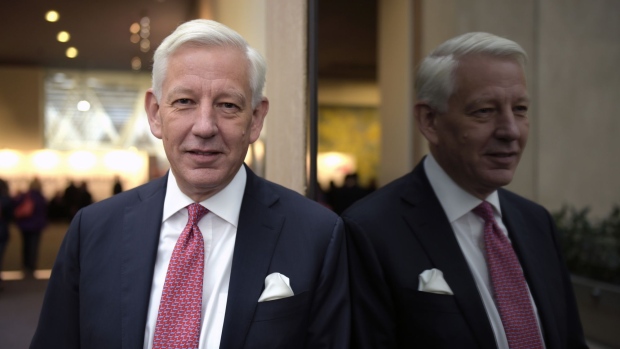Feb 1, 2023
Former McKinsey Chief Barton Denies Trudeau Ties Helped Win Contracts From Canada
, Bloomberg News

(Bloomberg) -- Dominic Barton, the former head of global consulting giant McKinsey & Co., dismissed claims that his ties to Prime Minister Justin Trudeau led to his firm being favored for Canadian government contracts.
Barton testified that he never oversaw McKinsey’s contracts with the Canadian government and said he only had a professional relationship with Trudeau.
“I’m not a close personal friend of the prime minister,” Barton said at a Canadian parliamentary committee hearing. When asked if he would put Trudeau on a list of his 50 best friends, he answered “no,” and said he has had effectively no social contact with him.
“I think he respects me,” Barton said, speaking about his role as an economic adviser to the government. “I don’t have his personal phone number, and I haven’t been in a room alone with him.”
Opposition lawmakers have had Barton in their sights because McKinsey’s contracts from various government departments rose sharply in the past five years, though they have remained much lower overall than those handed out to other major consulting firms, including Deloitte LLP and PricewaterhouseCoopers LLP.
Since Trudeau took office in 2015, Barton has led an advisory council on economic growth and served as ambassador to China from 2019 to 2021. In that post, he was tasked with defusing a diplomatic crisis over Canada’s arrest of a top Huawei executive on a US extradition request and China’s subsequent detainment of two Canadian citizens.
But Barton, who is now chairman of mining giant Rio Tinto Plc, said he also served in advisory roles under the Conservative government of Stephen Harper.
“I’m not a partisan,” Barton told the committee. “I’m not a member or supporter of any political party in Canada.”
He also said government contracts awarded to McKinsey weren’t handed out by political staff, but through an established process overseen by public servants.
“McKinsey has publicly stated that the vast majority were the result of publicly tendered, competitive requests for proposals independently evaluated by public servants based on objective, point-rated technical and pricing criteria,” he said.
The issue first came to light after academics and media outlets calculated the rise government outsourcing to consulting firms during Trudeau’s time in power. One group of university researchers set set up a website to track the contracts being handed out, flagging it as a sign of declining government capacity and a transfer of influence to the private sector.
In early January, state broadcaster Radio-Canada published a report noting that McKinsey’s contracts went from effectively zero when Trudeau took office in 2015 to a total of at least C$66 million ($50 million) in the seven years since. When a parliamentary committee began studying the matter, a government statement put the figure even higher, topping C$100 million.
Academic researchers speaking to the committee have pointed out that other firms have received much richer contracts in this time period, and told lawmakers there is no evidence to suggest McKinsey’s contracts were awarded suspiciously.
“The bigger erosion of state capacity is what this committee has the opportunity to address,” Carleton University Professor Amanda Clarke said in testimony on Monday. “I think McKinsey is a bit of a distraction, if I’m being honest, from the real issue.”
--With assistance from Stephen Wicary.
©2023 Bloomberg L.P.





